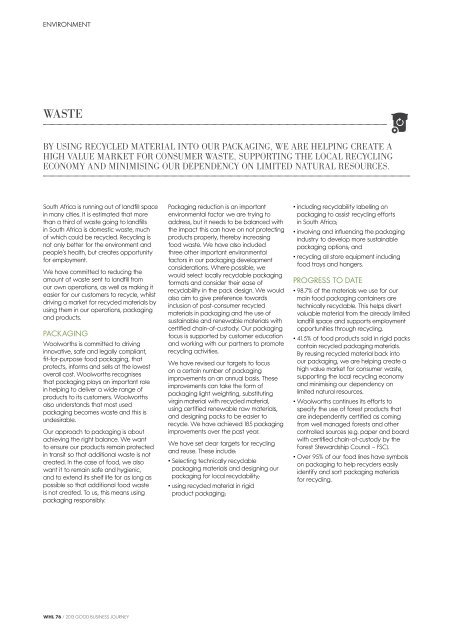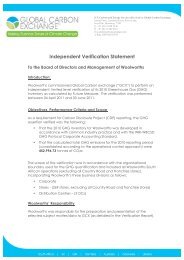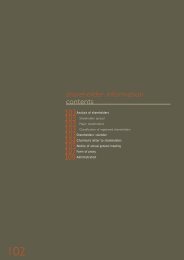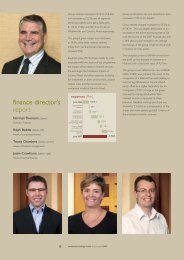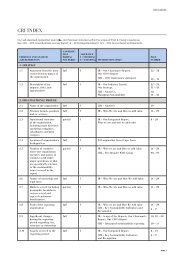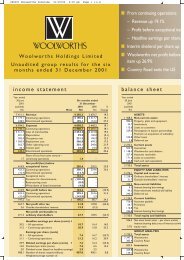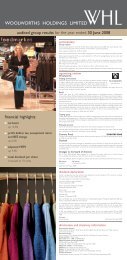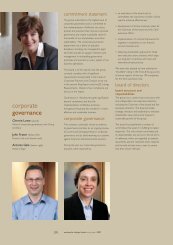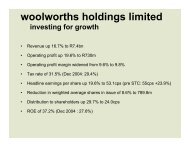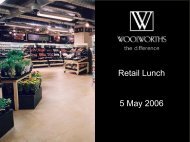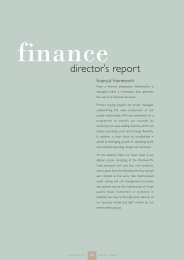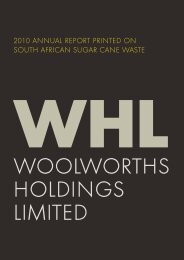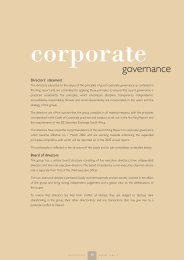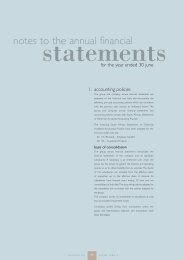WoolWorths holdings limited 2013 good BUsiness JoUrneY report
WoolWorths holdings limited 2013 good BUsiness JoUrneY report
WoolWorths holdings limited 2013 good BUsiness JoUrneY report
Create successful ePaper yourself
Turn your PDF publications into a flip-book with our unique Google optimized e-Paper software.
Environment<br />
WASTE<br />
By using recycled material into our packaging, we are helping create a<br />
high value market for consumer waste, supporting the local recycling<br />
economy and minimising our dependency on <strong>limited</strong> natural resources.<br />
South Africa is running out of landfill space<br />
in many cities. It is estimated that more<br />
than a third of waste going to landfills<br />
in South Africa is domestic waste, much<br />
of which could be recycled. Recycling is<br />
not only better for the environment and<br />
people’s health, but creates opportunity<br />
for employment.<br />
We have committed to reducing the<br />
amount of waste sent to landfill from<br />
our own operations, as well as making it<br />
easier for our customers to recycle, whilst<br />
driving a market for recycled materials by<br />
using them in our operations, packaging<br />
and products.<br />
PACKAGING<br />
Woolworths is committed to driving<br />
innovative, safe and legally compliant,<br />
fit-for-purpose food packaging, that<br />
protects, informs and sells at the lowest<br />
overall cost. Woolworths recognises<br />
that packaging plays an important role<br />
in helping to deliver a wide range of<br />
products to its customers. Woolworths<br />
also understands that most used<br />
packaging becomes waste and this is<br />
undesirable.<br />
Our approach to packaging is about<br />
achieving the right balance. We want<br />
to ensure our products remain protected<br />
in transit so that additional waste is not<br />
created. In the case of food, we also<br />
want it to remain safe and hygienic,<br />
and to extend its shelf life for as long as<br />
possible so that additional food waste<br />
is not created. To us, this means using<br />
packaging responsibly.<br />
Packaging reduction is an important<br />
environmental factor we are trying to<br />
address, but it needs to be balanced with<br />
the impact this can have on not protecting<br />
products properly, thereby increasing<br />
food waste. We have also included<br />
three other important environmental<br />
factors in our packaging development<br />
considerations. Where possible, we<br />
would select locally recyclable packaging<br />
formats and consider their ease of<br />
recyclability in the pack design. We would<br />
also aim to give preference towards<br />
inclusion of post-consumer recycled<br />
materials in packaging and the use of<br />
sustainable and renewable materials with<br />
certified chain-of-custody. Our packaging<br />
focus is supported by customer education<br />
and working with our partners to promote<br />
recycling activities.<br />
We have revised our targets to focus<br />
on a certain number of packaging<br />
improvements on an annual basis. These<br />
improvements can take the form of<br />
packaging light weighting, substituting<br />
virgin material with recycled material,<br />
using certified renewable raw materials,<br />
and designing packs to be easier to<br />
recycle. We have achieved 185 packaging<br />
improvements over the past year.<br />
We have set clear targets for recycling<br />
and reuse. These include:<br />
• Selecting technically recyclable<br />
packaging materials and designing our<br />
packaging for local recyclability;<br />
• using recycled material in rigid<br />
product packaging;<br />
• including recyclability labelling on<br />
packaging to assist recycling efforts<br />
in South Africa;<br />
• involving and influencing the packaging<br />
industry to develop more sustainable<br />
packaging options; and<br />
• recycling all store equipment including<br />
food trays and hangers.<br />
PROGRESS TO DATE<br />
• 98.7% of the materials we use for our<br />
main food packaging containers are<br />
technically recyclable. This helps divert<br />
valuable material from the already <strong>limited</strong><br />
landfill space and supports employment<br />
opportunities through recycling.<br />
• 41.5% of food products sold in rigid packs<br />
contain recycled packaging materials.<br />
By reusing recycled material back into<br />
our packaging, we are helping create a<br />
high value market for consumer waste,<br />
supporting the local recycling economy<br />
and minimising our dependency on<br />
<strong>limited</strong> natural resources.<br />
• Woolworths continues its efforts to<br />
specify the use of forest products that<br />
are independently certified as coming<br />
from well managed forests and other<br />
controlled sources (e.g. paper and board<br />
with certified chain-of-custody by the<br />
Forest Stewardship Council – FSC).<br />
• Over 95% of our food lines have symbols<br />
on packaging to help recyclers easily<br />
identify and sort packaging materials<br />
for recycling.<br />
WHL 76 / <strong>2013</strong> GOOD BUSINESS JOURNEY


